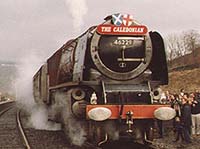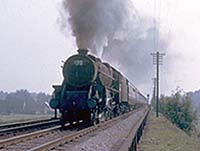|
The
principal features of West Coast Main line operation in the 1950's were
the heavy loadings and the stiff bookings. Many of the services produced
14, 15, and 16 coach loads. One southbound services often 17. And whilst
the Coronation Pacifics and the Rebuilt Scots could produce consistently
good work in the right hands, the Jubilee's were variable. When they were
good they were very good, but when they were bad, they were. But
Schedules, whether the XL,
Special Limit, or Limited Load, had no recovery time included. So if you
had a signal check, or a p.w. slowing, you were late. Unless you had a
good loco and a keen driver and fireman.
|
|

